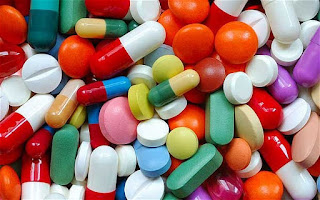Glucagon
Trade name:
Glucagon
Class: First generation sulfonylurea
Pregnancy: (Category B)
Action: mobilising glycogen stored in the liver
Uses: Glucagon is a hormone that
causes the liver to release glucose into the blood. It is used to quickly
increase blood sugar levels in diabetics with low blood sugar
(hypoglycemia). This medication may also be used during
certain medical tests.
Dose
§ by subcutaneous, intramuscular, or intravenous injection, Adult
and
Child over 8 years (or body-weight over 25 kg), 1 mg;
§ Child under 8 years (or body-weight under 25 kg), 500
micrograms; if no response within 10 minutes intravenous glucose must be given Side Effects:
§ Nausea and vomiting may occur but are also signs of low blood
sugar.
§ Allergy symptoms such as skin rash and breathing trouble have
been reported with this medication.
Nursing
considerations:
§ Be aware of symptoms of hypoglycemia -
stomach pain, anxious feeling, chills, cold sweats, confusion, cool skin,
difficulty in concentrating, drowsiness, hunger, rapid heart rate, headache,
nausea, vomiting, shakiness, unsteadiness, vision changes or weakness. Pt
should instructed to eat or drink a source of sugar if he experiences these
symptoms.
§ After injection of Glucagon, the patient must be turned on their
side to avoid choking.
§ Glucagon is only effective for 90 minutes and is to be used only
until the patient is able to swallow.
§ The blood sugar should be checked hourly for 3 to 4 hours after
regaining consciousness.




